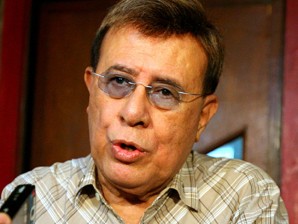Morato’s arraignment for electioneering raps deferred

FORMER PCSO chair Manuel “Manoling” Morato. INQUIRER FILE PHOTO
MANILA, Philippines—A Quezon City court deferred Tuesday morning’s arraignment of former Philippine Charity Sweepstakes Office (PCSO) chairman Manuel Morato pending the resolution of his motion seeking to junk the multiple counts of electioneering filed against him for lack of probable cause.
Morato claimed that the multiple charges of violation of Republic Act 9006 or the Fair Elections Act and Batas Pambansa 881 or the Omnibus Election Code filed against him were intended to “punish” his exercise of free speech, expression, or of the press.
In Tuesday morning’s proceedings, Quezon City branch 87 Judge Aurora Hernandez-Calledo deferred Morato’s entry of a plea to give way to the motion to dismiss filed by the former PCSO official.
Calledo gave the Commission on Elections (Comelec) lawyers 10 days from Tuesday’s scheduled hearing to file their comment on Morato’s motion and five days upon receipt of the comment for the defense counsel to file a reply, after which the motion will be deemed submitted for resolution.
In his 20-page motion Morato claimed, “The alleged acts imputed against the accused as partisan political activity are nothing but pure harassment and political persecution, and also to curtail his freedom of speech, of expression, or of the press guaranteed under the Bill of Rights, available even to members of the civil service whose public positions should not inhibit them from the exercise of their rights and duties as citizens.”
Article continues after this advertisementMorato had been charged with four counts of electioneering for allegedly using two years ago several episodes of his public affairs television show “Dial M,” aired over government TV channel IBC-13, to campaign for then presidential candidate Gilbert Teodoro and his runningmate Eduardo Manzano in the 2010 national elections while urging the public not to vote for certain senatorial candidates.
Article continues after this advertisementSpecifically the four counts of election-related offenses that Morato allegedly violated include: the use of public funds, equipment, facilities owned or controlled by the government for any election campaign or for any partisan political activity; two counts of prohibited forms of election propaganda; and publication or broadcasting through mass media of political advertisement or propaganda prior to the effectivity of the Comelec rules and regulations.
In his motion, the former PCSO official initially pointed out that the country’s criminal justice system has been designed to favor the accused, thus, “The spirit and reason of the criminal laws are to be construed against the State including its procedural aspects.”
He described the complaint filed by lawyer Bonifacio Alentajan against him as hearsay claiming that the case was pursued “on the basis of what he (Alentajan) allegedly heard in the July 18, 2011 Senate Blue Ribbon Committee hearing.” He emphasized that the complainant never presented authenticated copies of the subject broadcasts to the poll body during the preliminary investigation.
Morato further said, “The Comelec — despite its powers and resources — during the election period did not lift a finger to call the attention of the accused or anybody else, much less enjoin the program (Dial M) like what have been done before with other parties. Rather, belated and with more fangs, the Comelec chose to file the four criminal cases as subsequent punishments proscribed by no less than the Constitution.”
“Because of the manifest violation of the constitutional rights of the accused to free speech, due process and equal protection of the law, the four criminal cases do not stand as sufficient probable cause to hold the accused for trial and therefore necessitating the immediate dismissal of the cases,” he maintained.
Morato claimed that as a board member of the PCSO, at the time the alleged electioneering activities were committed, he was not prohibited from engaging in political activity and is exempt from criminal liability with his being a political appointee as an absolutory cause.
He pointed out that his roles as a political appointee and as a media man hosting the TV program could not be separated during the public forum portion of “Dial M” where he was guaranteed freedom of speech, expression and of the press, stressing, “It is impossible to engage in public discourse without taking sides every now and then.”
The former PCSO official also held that his display of election paraphernalia during his program was not an election offense.
Morato further maintained that he should not be held for trial based on unconstitutional laws and that doubts should be resolved in his favor, stating, “The accused begs and invokes for adherence to the strict interpretation of penal laws against the State and for the equipoise rule.”
He explained that under the equipoise rule, “If the inculpatory facts and circumstances are capable of two or more explanations, one of which is consistent with the innocence of the accused and the other consistent with his guilt, then the evidence does not fulfill the moral certainty and is not sufficient to support a conviction of the accused.”
“Hence, where the evidence of the parties in a criminal case are evenly balanced, the constitutional presumption of innocence should tilt the scales in favor of the accused and he must be acquitted,” he concluded.